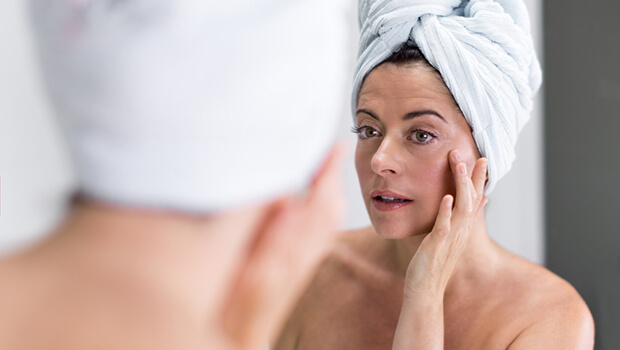
Recently, scientists proved that there's a connection between rosacea and Alzheimer's disease. A study from the University of Copenhagen found that people with rosacea tend to have a slightly increased risk of Alzheimer's, perhaps because of the role inflammation plays in both conditions. If you have rosacea, this is a risk you may want to be mindful of. And according to research recently published in the Journal of the American Academy of Dermatology, it's not the only condition you need to keep an eye out for.
That's because rosacea shares a genetic location with several other autoimmune diseases. So if you develop rosacea, this could mean you have a genetic predisposition to develop another autoimmune disease as well. These diseases include type-1 diabetes mellitus, celiac disease, multiple sclerosis (MS), and rheumatoid arthritis.
Researchers decided to conduct a study to determine the odds ratios (ORs) of patients with rosacea developing one of these diseases. To do this, they compared 6,759 patients with rosacea to 33,795 control subjects. They found that there was indeed a connection.
Now You Can Give Your Body the Same, Easy Age-Defying Treatment You Give Your Face.
Scientists find that this breakthrough helps your skin look "11 years younger in 4 weeks."
Learn More Now
In particular, the ORs for type-1 diabetes mellitus, celiac disease, MS, and rheumatoid arthritis were 2.59, 2.03, 1.65, and 2.14, respectively. Interestingly, these links were mainly found in women. Men only seem to have a statistically significant increase in their risk of developing rheumatoid arthritis.
This news may seem discouraging. But remember, just because you have a genetic predisposition to a disease doesn't mean you're guaranteed to develop it. Our lifestyle choices play a significant role in what genes our bodies choose to turn on and off. You can offset this risk by taking steps to reduce inflammation, such as exercising, eating healthfully, and minimizing stress.
Keep in mind that at times, these conditions are hard to diagnose. So this information can give you a starting point if you're having health issues, but your doctor is having trouble pinpointing the cause. If you’ve experienced rosacea and begin experiencing other issues, ask your doctor if an autoimmune disease could be at the root. This could be the clue he or she needs to correctly identify the problem and begin treating it effectively.
To your health, naturally,

Janet Zand
Source:
http://www.jaad.org/article/S0190-9622(15)02465-2/abstract.